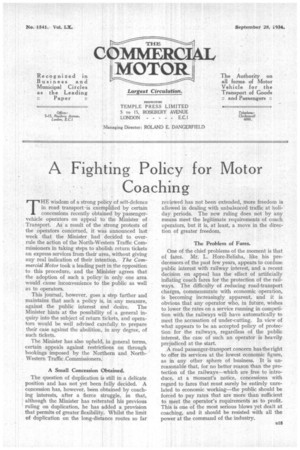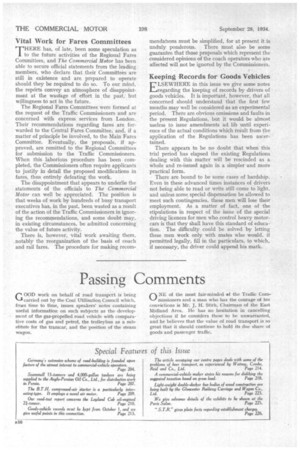A Fighting Policy for Motor Coaching
Page 25

Page 26

If you've noticed an error in this article please click here to report it so we can fix it.
THE wisdom of a strong policy of self-defence in road transport is exemplified by certain concessions recently obtained by passengervehicle operators on appeal to the Minister of Transport. As a result of the strong protests of the operators concerned, it was announced last week that the Minister had decided to overrule the action of the North-Western Traffic Commissioners in taking steps to abolish return tickets on express services from their area, without giving any real indication of their intention. The Commercial Motor took a leading part in the opposition to this procedure, and the Minister agrees that the adoption of such a policy in only one area would cause inconvenience to the public as well as to operators.
This journal, however, goes a step farther and maintains that such a policy is, in any measure, against the public interest and desire. The Minister hints at the possibility of a general inquiry into the subject of return tickets, and operators would be well advised carefully to prepare their case against the abolition, in any degree, of such tickets.
The Minister has also upheld, in general terms, certain appeals against restrictions on through bookings imposed by the Northern and NorthWestern Traffic Commissioners.
A Small Concession Obtained.
The question of duplication is still in a delicate position and has not yet been fully decided. A concession has, however, been obtained by coaching interests, after a fierce struggle, in that, although the Minister has reiterated his previous ruling on duplication, he has added a provision that permits of greater flexibility. Whilst the limit of duplication on the long-distance routes so far reviewed has not been extended, more freedom is allowed in dealing with unbalanced traffic at holiday periods. The new ruling does not by any means meet the legitimate requirements of coach operators, but it is, at least, a move in the direction of greater freedom.
The Problem of Fares.
One of the chief problems of the moment is that of fares. Mr. L. Hore-Belisha, like his predecessors of the past few years, appears to confuse public interest with railway interest, and a recent decision on appeal has the effect of artificially inflating coach fares for the protection of the railways. The difficulty of reducing road-transport charges, commensurate with economic operation, is becoming increasingly apparent, and it is obvious that any operator who, in future, wishes to lower the rates on a service running in competition with the railways will have automatically to meet the accusation of under-cutting. In view of what appears to be an accepted policy of protection for the railways, regardless of the public interest, the case of such an operator is heavily prejudiced at the start.
A road passenger-transport concern has the right to offer its services at the lowest economic figure, as in any other sphere of business. It is unreasonable that, for no better reason than the protection of the railways—which are free to introduce, at a moment's notice, concessions with regard to fares that must surely be entirely unrelated to economic working—the public should be forced to pay rates that are more than sufficient to meet the operator's requirements as to profit. This is one of the most serious blows yet dealt at coaching, and it should be resisted with all the power at the command of the industry.
Vital Work for Fares Committees
THERE has, of late, been some speculation as to the future activities of the Regional Fares Committees, and The Commercial Motor has been able to secure official statements from the leading members, who declare that their Committees are still in existence and are prepared to operate should they be required to do so. To our mind, the reports convey an atmosphere of disappointment at the wastage of effort in the past, but willingness to act in the future. The Regional Fares Committees were formed at the request of the Traffic Commissioners and are concerned with express services from London. Their recommendations regarding fares are forwarded to the Central Fares Committee, and, if a matter of principle be involved, to the Main Fares Committee. Eventually, the proposals, if approved, are remitted to the Regional Committees for submission to the Traffic Commissioners. When this laborious procedure has been completed, the Commissioners often require applicants to justify in detail the proposed modifications in fares, thus entirely defeating the work. The disappointment that appears to underlie the statements of the officials to The Commercial Motor can well be appreciated. The position is that weeks of work by hundreds of busy transport executives has, in the past, been wasted as a result of the action of the Traffic Commissioners in ignoring the recommendations, and some doubt may, in. existing circumstances, be admitted concerning the value of future activity. There is, however, vital work awaiting them, notably the reorganization of the basis of coach and rail fares. The procedure for making recom mendabons must be simplified, for at present it is unduly ponderous. There must also be some guarantee that those proposals which represent the considered opinions of the coach operators who are affected will not be ignored by the Commissioners.
Keeping Records for Goods Vehicles
LSEWHERE in this issue we give some notes L.iregarding the keeping of records by drivers of goods vehicles. It is important, however, that all concerned should understand that the first few months may well be considered as an experimental period. There are obvious omissions and faults in the present Regulations, but it would be almost useless to issue amendments ad lib until experience of the actual conditions which result from the application of the Regulations has been ascertained.
There appears to be no doubt that when this trial period has elapsed the existing Regulations dealing with this matter will be rescinded as a whole and re-issued again in a simpler and more practical form. There are bound to be some cases of hardship. Even in these advanced times instances of drivers not being able to read or write still come to light, and unless some special dispensation be allowed to meet such contingencies, these men will lose their employment. As a matter of fact, one of the stipulations in respect of the issue of the special driving licences for men who control heavy motorcars is that they shall have this standard of education. The difficulty could be solved by letting these men work only with mates who would, if permitted legally, fill in the particulars, to which, if necessary, the driver could append his mark.




















































































